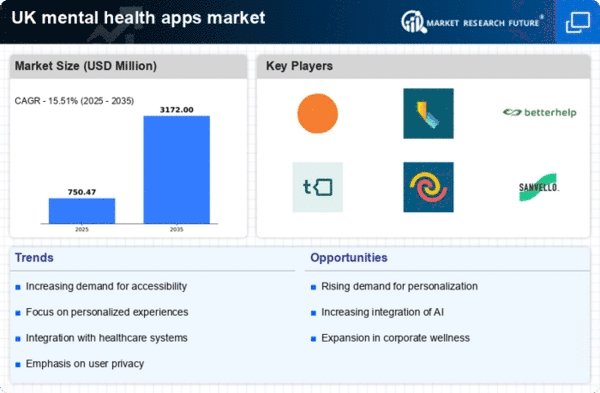Technological Advancements
Technological innovations are significantly influencing the mental health-apps market. The integration of artificial intelligence (AI) and machine learning into these applications enhances user experience by providing personalized recommendations and tailored content. As of November 2025, it is estimated that around 40% of mental health apps in the UK utilize AI-driven features, which may improve user engagement and satisfaction. Furthermore, advancements in mobile technology, such as improved connectivity and user-friendly interfaces, facilitate easier access to mental health resources. This trend suggests that as technology continues to evolve, the mental health-apps market will likely expand, attracting a broader audience seeking effective mental health solutions.
Rising Mental Health Awareness
The increasing awareness surrounding mental health issues in the UK appears to be a primary driver for the mental health-apps market. Campaigns and initiatives aimed at destigmatizing mental health have led to a greater acceptance of seeking help. According to recent surveys, approximately 70% of individuals in the UK now recognize the importance of mental well-being, which has resulted in a surge in demand for accessible mental health solutions. This heightened awareness is likely to encourage more users to explore mental health apps as viable options for support and self-care. Consequently, the mental health-apps market is experiencing growth as more individuals seek tools that can assist them in managing their mental health effectively.
Government Initiatives and Funding
Government initiatives aimed at improving mental health services in the UK are likely to bolster the mental health-apps market. Recent policies have focused on increasing funding for mental health resources, with the UK government allocating approximately £2 billion to mental health services over the next few years. This financial support may encourage the development and promotion of mental health apps as part of a comprehensive approach to mental health care. Additionally, partnerships between app developers and public health organizations could enhance the credibility and reach of these applications. As a result, the mental health-apps market may benefit from increased visibility and user adoption, driven by government backing.
Increased Focus on Work-Life Balance
The growing emphasis on work-life balance in the UK is influencing the mental health-apps market. As employees face rising stress levels and burnout, there is a heightened demand for tools that promote mental well-being. Surveys indicate that nearly 50% of UK workers are actively seeking resources to manage stress and improve their mental health. This trend is likely to drive the adoption of mental health apps that offer features such as mindfulness exercises, stress management techniques, and emotional support. Consequently, the mental health-apps market may experience growth as organizations and individuals recognize the importance of mental health in achieving a balanced lifestyle.
Shift Towards Digital Health Solutions
The ongoing shift towards digital health solutions is a notable driver for the mental health-apps market. With the rise of telehealth and online therapy, users are increasingly seeking digital alternatives for mental health support. Data indicates that approximately 60% of individuals in the UK prefer using apps for mental health management over traditional face-to-face consultations. This trend suggests a growing acceptance of technology as a means to address mental health concerns. As more individuals turn to digital platforms for assistance, the mental health-apps market is poised for growth, reflecting a broader societal shift towards embracing technology in healthcare.
















